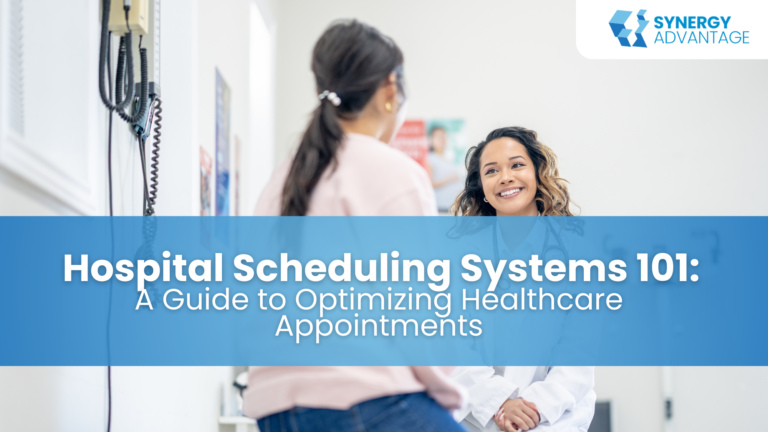Hospital Scheduling Systems 101: A Guide To Optimizing Healthcare Appointments
Transitioning from key insights to practical advice and managing appointments often poses significant challenges for hospitals. The complexity of scheduling can lead to inefficiencies and increased patient no-shows, causing frustration among staff and patients alike. One crucial fact stands out: medical scheduling systems are revolutionizing the way healthcare operates.
These systems are designed to streamline the appointment process, reduce administrative burdens, and enhance overall patient experience. This article will explore how a hospital scheduling system can effectively tackle these challenges, providing innovative solutions that lead to smoother operations and improved patient care.
Key Takeaways
- Hospital scheduling systems manage medical appointments efficiently, offering automated reminders to reduce no-shows and integrate with EHR for seamless patient data access.
- These systems boost patient satisfaction by allowing easy appointment bookings through online portals and apps, also reducing wait times by optimizing resource utilization.
- Staff efficiency improves with hospital scheduling systems through less manual work and better coordination among healthcare teams, resulting in a more productive workflow.
- Overcoming implementation barriers involves addressing privacy concerns through secure data handling practices and training staff to maximize the system’s benefits.
What is a Hospital Scheduling System?

A modern hospital scheduling system is a vital technology in healthcare for managing appointments efficiently. This software organizes patient appointments, physician schedules, and facility usage, streamlining the process of consultations, surgeries, and follow-up visits in clinics and hospitals.
This system integrates with electronic health records (EHR) to provide quick access to patient information, enabling informed scheduling decisions. Its goal is to maximize resource use and minimize patient wait times. Hospital scheduling systems manage bookings, cancellations, rescheduling, and automated appointment reminders to reduce no-shows.
Key Benefits of Hospital Scheduling Systems
The main advantage of hospital scheduling systems is significantly reduced missed appointments. Automated reminders to patients lower the chances of forgotten visits, resulting in fewer absences. This efficiency optimizes healthcare resources, allowing for fully booked physician schedules and accurate patient traffic forecasts. As a result, medical facilities can better distribute staff and enhance operational effectiveness.
Moreover, it enhances patient satisfaction. They streamline appointment processes and reduce wait times, significantly improving the patient experience. User-friendly online portals and mobile apps allow patients to easily schedule appointments, access medical records, and receive automated reminders. This efficiency decreases wait times and fosters a stronger connection between patients and providers through personalized communication.
These systems provide flexible scheduling options, allowing staff to quickly adapt to changing demands and allocate resources effectively, leading to a more productive workflow. They empower staff with real-time access to critical patient information, enhancing coordination among multidisciplinary teams. This improves operational efficiency and communication, enabling staff to proactively address patient needs while managing appointments effectively within the organization.
Must-Have Features in Hospital Scheduling Systems

Research indicates that healthcare facilities using these reminders experienced up to a 30% decline in no-show rates, resulting in increased revenue and better resource allocation. Additionally, these reminders enhance patient satisfaction by helping to prevent missed appointments, improving adherence to treatment plans, and optimizing administrative processes for healthcare providers.
Real-time access to critical patient information enhances clinical decision-making and ensures coordinated care. A significant advantage is the creation of comprehensive patient profiles that include appointment schedules, medication records, and diagnostic results, allowing for personalized care. Additionally, integrating electronic health records supports accurate billing by capturing relevant services rendered during appointments.
Integrating flexible scheduling options in healthcare facilities is vital for enhancing accessibility and patient satisfaction. Many patients have busy schedules, so offering flexible appointment times supports patient-centered care by accommodating individual needs.
Furthermore, studies show flexible appointment times significantly lower no-show rates, improving clinic performance and revenue generation. By adapting to changing patient expectations and utilizing advanced scheduling technologies, clinics can effectively enhance service delivery and meet diverse consumer demands.
Overcoming Barriers to Implementation
Clinic scheduling systems handle sensitive patient data, making it essential to ensure data protection and compliance with privacy regulations. Implementing strong security measures, such as data encryption, HIPAA adherence, and unique user access levels, is crucial for maintaining patient confidentiality. Additional features like anonymized reporting and audit trails enhance accountability in data handling.
Staff training is essential for the successful implementation of a hospital scheduling system. Comprehensive training on the system’s functionality helps staff streamline appointment management and improve patient experience. Practical training addresses privacy concerns by educating staff on data protection protocols and compliance, ensuring the confidentiality and security of patient information.
Conclusion
Hospital scheduling systems play a crucial role in optimizing healthcare appointments. They help reduce missed appointments, enhance patient satisfaction, and improve staff efficiency. Automated reminders and seamless EHR integration can further streamline the scheduling process. Overcoming privacy concerns and providing comprehensive staff training are vital for successful implementation.
By embracing personalized hospital scheduling systems, healthcare facilities can unlock the potential to provide efficient and effective patient care while maximizing operational productivity.
FAQs
What is a hospital scheduling system?
A hospital scheduling system is a software solution designed to manage patient appointments, physician schedules, and resource allocation within healthcare facilities. It streamlines the scheduling process, reduces administrative burdens, and enhances overall patient care by allowing staff to coordinate consultations, surgeries, and follow-up visits efficiently.
How can an efficient scheduling system reduce no-show rates?
An efficient scheduling system reduces no-show rates by sending automated appointment reminders via text, email, or phone calls, which keep patients informed about their upcoming appointments. Additionally, it allows for flexible scheduling options and easy rescheduling, making it more convenient for patients to attend.
How vital is HIPAA compliance for a scheduling system?
HIPAA compliance is vital for a scheduling system because it protects sensitive patient information and maintains confidentiality. Compliance helps healthcare organizations prevent data breaches, avoid legal penalties, and build patient trust. A HIPAA-compliant scheduling system incorporates security measures to safeguard health data during appointment management.
References
Ehrenstein V, Kharrazi H, Lehmann H, et al. Obtaining Data From Electronic Health Records. In: Gliklich RE, Leavy MB, Dreyer NA, editors. Tools and Technologies for Registry Interoperability, Registries for Evaluating Patient Outcomes: A User’s Guide, 3rd Edition, Addendum 2 [Internet]. Rockville (MD): Agency for Healthcare Research and Quality (US); 2019 Oct. Chapter 4. Available from: https://www.ncbi.nlm.nih.gov/books/NBK551878/
Rosen MA, DiazGranados D, Dietz AS, et al. Teamwork in healthcare: Key discoveries enabling safer, high-quality care. Am Psychol. 2018;73(4):433-450. doi:10.1037/amp0000298 https://pmc.ncbi.nlm.nih.gov/articles/PMC6361117/
Tariq RA, Hackert PB. Patient Confidentiality. [Updated 2023 Jan 23]. In: StatPearls [Internet]. Treasure Island (FL): StatPearls Publishing; 2024 Jan-. Available from: https://www.ncbi.nlm.nih.gov/books/NBK519540/

